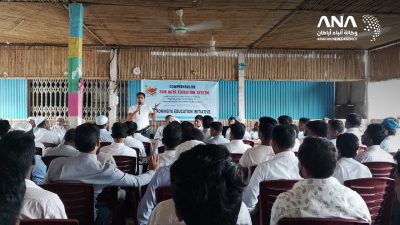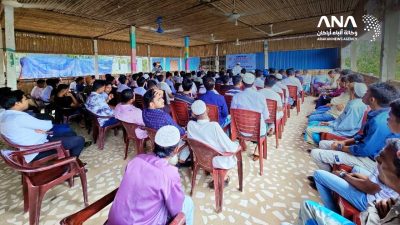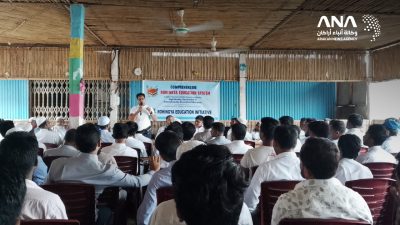Arakan News Agency | Exclusive
Today, Tuesday, leaders of the Rohingya, educators, and community members held a meeting at camp 1E in Cox’s Bazar, Bangladesh, to discuss the future of education within the refugee camps. This meeting aimed at enhancing an inclusive educational system that benefits thousands of Rohingya children and adolescents.

According to a correspondent from Arakan News Agency, participants emphasized the necessity of unifying schools and religious institutes under a coordinated structure ensuring better management of curricula, teacher training, and long-term sustainability.
They also stressed the urgent need for a well-structured educational system led by the community itself, asserting that education is not just a right but also a foundation for preserving the culture, language, and identity of the Rohingya in exile.
The meeting addressed the importance of cooperation between community organizations to avoid duplication and improve educational quality, in addition to exploring the possibility of involving international partners for support, while ensuring that leadership remains in the hands of the local community.
The meeting concluded with a collective commitment to advance towards building an integrated educational framework, with optimism that this step would ensure the Rohingya children receive high-quality structured education, equipping them with necessary skills and knowledge for the future.

This meeting comes as a new step in the ongoing efforts of the Rohingya to secure the right to education for their children, despite living conditions in the world’s largest refugee camp.
Previously, the United Nations Children’s Fund (UNICEF) warned that 350,000 Rohingya refugee children might be permanently deprived of education by 2026 due to sharp cuts in international educational funding.
A few months ago, UNICEF announced the closure of several of its educational centers in the Rohingya camps in Bangladesh due to a lack of international funding. Meanwhile, there have been widespread demands from the refugees to reopen the centers, expressing fears for their children’s future, which is now threatened by being deprived of basic education.
—
























